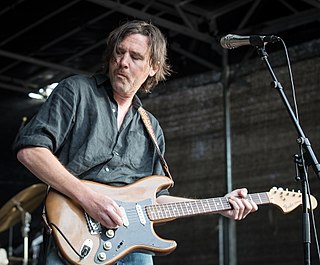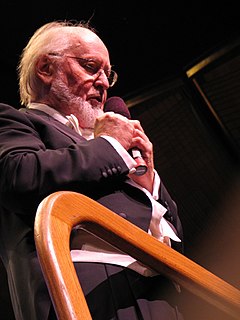A Quote by Lewis Thomas
The need to make music, and to listen to it, is universally expressed by human beings. I cannot imagine, even in our most primitive times, the emergence of talented painters to make cave paintings without there having been, near at hand, equally creative people making song. It is, like speech, a dominant aspect of human biology.
Quote Topics
Aspect
Been
Beings
Biology
Cannot
Cave
Cave Paintings
Creative
Creative People
Dominant
Emergence
Equally
Even
Expressed
Hand
Having
Human
Human Being
Human Beings
Imagine
Like
Listen
Make
Making
Most
Music
Near
Need
Our
Painters
Paintings
People
Primitive
Song
Speech
Talented
Times
Universally
Without
Related Quotes
The thing that will never go away is that connection you make with a band or a song where you're moved by the fact that it's real people making music. You make that human connection with a song like 'Let It Be' or 'Long and Winding Road' or a song like 'Bohemian Rhapsody' or 'Roxanne,' any of those songs. They sound like people making music.
Artists use frauds to make human beings seem more wonderful than they really are. Dancers show us human beings who move much more gracefully than human beings really move. Films and books and plays show us people talking much more entertainingly than people really talk, make paltry human enterprises seem important. Singers and musicians show us human beings making sounds far more lovely than human beings really make. Architects give us temples in which something marvelous is obviously going on. Actually, practically nothing is going on.
The question is wholly other, deeper and equally relevant to all: whether we shall, by whatever means, succeed in reconstituting the natural world as the true terrain of politics, rehabilitating the personal experience of human beings as the initial measure of things, placing morality above politics and responsibility above our desires, in making human community meaningful, in returning content to human speech, in reconstituting, as the focus of all social action, the autonomous, integral, and dignified human "I."
History leaves no doubt that among of the most regrettable crimes committed by human beings have been committed by those human beings who thought of themselves as civilized. What, we must ask, does our civilization possess that is worth defending? One thing worth defending, I suggest, is the imperative to imagine the lives of beings who are not ourselves and are not like ourselves: animals, plants, gods, spirits, people of other countries, other races, people of the other sex, places and enemies.
The thing is, right now the films don't need to be overtly political to be about our times. We also need films that are just human, that are about people. People need that, too. It's like we need to reconnect to what it is to be human. Not just what our political situation is. That's not what I'm thinking about exclusively. Human content is needed again, as it was in the '70s. I think films were more human than they've been since then.
The primordial image, or archetype, is a figure--be it a daemon, a human being, or a process--that constantly recurs in the course of history and appears wherever creative fantasy is freely expressed. Essentially, therefore, it is a mythological figure. . . . In each of these images there is a little piece of human psychology and human fate, a remnant of the joys and sorrows that have been repeated countless times in our ancestral history. . . .
Even in a jungle, lovely flowers will spring up here and there, such being the fecundity of nature, and however badly our pastors and masters run our society, however much they pull to pieces that which they claim to be keeping intact, nature remains fecund, human beings are born with human traits, sometimes human strength outweighs human weakness, and human grace shows itself amid human ugliness. ‘In the bloodiest times,’ as our play has it, ‘there are kind people.’
The profound nature of our existence is that we are able at any moment to connect to anyone, anywhere. History is there to remind us of how far weve come, and every day our journey is to continue with that progress of becoming more wise, more compassionate and more considerate human beings. Remembering Emmett though song is way to remind people that there is no need to continue with senseless crimes. Race and racism do no go hand in hand. We are only one race: human.




































